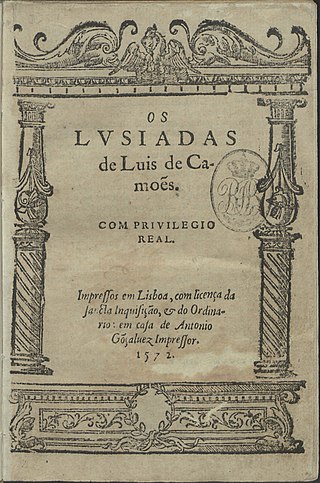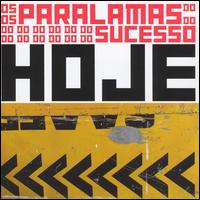| Perto de Deus | |
|---|---|
 | |
| Studio album by | |
| Released | November 30, 2004 |
| Recorded | April – May 2004 |
| Genre | Reggae |
| Label | Epic |
Perto de Deus (in English: "Near God") is an album of Brazilian reggae band Cidade Negra, released in 2004.
| Perto de Deus | |
|---|---|
 | |
| Studio album by | |
| Released | November 30, 2004 |
| Recorded | April – May 2004 |
| Genre | Reggae |
| Label | Epic |
Perto de Deus (in English: "Near God") is an album of Brazilian reggae band Cidade Negra, released in 2004.

Club de Regatas Vasco da Gama, commonly referred to as Vasco da Gama or simply Vasco, is a sports club based in Rio de Janeiro, Brazil. Although originally a rowing club and then a multi-sport club, Vasco is mostly known for its men's football team, which currently competes in the Campeonato Brasileiro Série A, the top tier of the Brazilian football league system, and in the Campeonato Carioca, the state of Rio de Janeiro's premier state league.

Os Lusíadas, usually translated as The Lusiads, is a Portuguese epic poem written by Luís Vaz de Camões and first published in 1572. It is widely regarded as the most important work of Portuguese-language literature and is frequently compared to Virgil's Aeneid. The work celebrates the discovery of a sea route to India by the Portuguese explorer Vasco da Gama (1469–1524). The ten cantos of the poem are in ottava rima and total 1,102 stanzas.

Cidade Negra is a Brazilian reggae band formed in 1986 in Rio de Janeiro. Their style is influenced by soul and rock music. Common themes of Cidade Negra songs include love and social issues.

João Teixeira de Faria, known also as João de Deus, is a Brazilian convicted rapist, self-proclaimed medium, and self-proclaimed psychic surgeon. He was based in Abadiânia, where he ran a spiritual healing center called the Casa de Dom Inácio de Loyola. He received media coverage on CNN, ABC News, and The Oprah Winfrey Show. James Randi and Joe Nickell exposed his healing procedures as nothing more than carnival tricks, and there is no evidence that the benefits reported by patients are anything more than placebo effects.
Diogo Soares de Albergaria, also known as Diego Soares de Melo, Diego Suarez de Melo and the "Galego", was a 16th-century Portuguese navigator and explorer.

God Is Brazilian is a 2003 Brazilian fantasy comedy-drama film co-written and directed by Carlos Diegues, based on the short story O Santo que Não Acreditava em Deus by João Ubaldo Ribeiro. In the film, God, portrayed by Antônio Fagundes, decides to take a vacation and heads to Northeastern Brazil to find a saint as a replacement. Filming took place over the course of 64 days in the Brazilian states of Tocantins, Alagoas, Pernambuco and Rio de Janeiro.
António José da Silva GarridoOIH was a Portuguese football referee.
Éder Luís de Oliveira, known simply as Éder Luís, is a Brazilian professional footballer who plays as a winger.

Roberto Farias was a Brazilian film director, producer and screenwriter. He directed 15 films during his career. His 1982 film Pra Frente, Brasil was entered into the 33rd Berlin International Film Festival. Farias' brother Reginaldo Faria is also a film director and actor.
Rui Jorge Faria Azevedo, known as Faria, is a Portuguese former footballer who played as a goalkeeper.

Hoje is the eleventh studio album by Brazilian rock band Os Paralamas do Sucesso. The songs were composed after Herbert Vianna's accident, unlike Longo Caminho. The album features three special participations: Manu Chao, Marcelinho da Lua and Andreas Kisser. The track "Na Pista" received a video which was nominated for the 2006 MTV Video Music Brazil award.
The 2010 season was the 115th year in the club's history, the 99th season in Clube de Regatas do Flamengo's football existence, and their 40th in the Brazilian Série A, having never been relegated from the top division.
Estêvão da Gama was a Portuguese navigator and explorer who discovered the Trindade and Martim Vaz islands in modern Brazil.
The 4th Portuguese India Armada was a Portuguese fleet that sailed from Lisbon in February, 1502. Assembled on the order of King Manuel I of Portugal and placed under the command of D. Vasco da Gama, it was the fourth of some thirteen Portuguese India Armadas, was Gama's second trip to India, and was designed as a punitive expedition targeting Calicut to avenge the numerous defeats of the 2nd Armada two years earlier.

Anderson Vieira Martins is a Brazilian former professional footballer who played as a centre-back.

Events in the year 1940 in Brazil.
Rafael Copetti Fernandes is a Brazilian professional footballer who plays as a goalkeeper for Gama.

Events in the year 1956 in Brazil.
João da Gama was a Portuguese explorer and colonial administrator in the Far East in the last quarter of the 16th century. He was the grandson of Vasco da Gama. João da Gama sailed from Macau to northeast and rounded Japan by north. He crossed the Pacific Ocean at the northernmost latitudes taken until then by Europeans. Forced by the circumstances of his voyage, he became also a circumnavigator. The lands northeast of Japan which João da Gama discovered were the target of legend and speculation in the centuries that followed, inspiring its search by European powers.